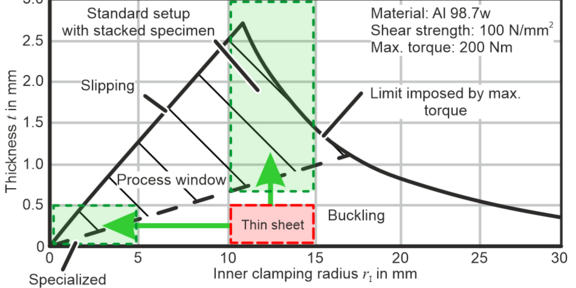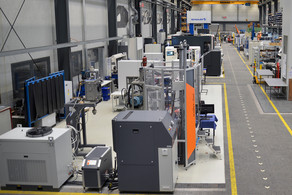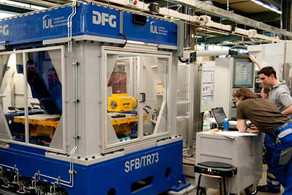Characterization of thin sheets using the in-plane torsion test
- Profil- und Blechumformung
- Materialcharakterisierung
- Industrienahe Forschung

Project description-old
The in-plane torsion test (IPTT) has been successfully used to characterize metal sheets. It is distinguished by its ability to generate flow curves up to high strains and its ability to determine the kinematic hardening behavior. However, the process limit of buckling in thin sheets – with thicknesses ranging from 0.1 to 0.5 mm – leads to a significant reduction in the maximum achievable strain.
Previous studies have identified two measures to address this problem:
- Stacking and bonding multiple layers of sheet metal
- Reducing the inner clamping diameter
This transfer project aims to analyze and apply these two measures for the first time in order to comprehensively characterize thin sheets. The implementation of the second measure requires the development of a specialized test setup. Erichsen GmbH & Co. KG plays a central role as a consultant during this development due to its extensive expertise in this field.
The material models determined as part of the project will be used by the industry partners thyssenkrupp Rasselstein GmbH and Novelis for numerical simulations of relevant manufacturing processes. Ironing in one stroke will be studied by Novelis and Stretch bend levelling by thyssenkrupp Rasselstein GmbH. The influence of the extended material models on the results will be systematically determined and evaluated.
Funding and contact
| Funding | German Research Foundation (DFG) |
| Project | 551704509 |
| Project Partners | thyssenkrupp Rasselstein GmbH, Novelis, Erichsen GmbH & Co. KG |
| Contact | Christopher Horstmann M. Sc. |
| Project runtime | 01.05.2025 – 01.05.2027 |
| Status | ongoing |
Publications
Stiebert, F., Traphöner, H., Tekkaya, A.E., 2025. In-plane torsion test – analysis and design of the clamps. International journal of material forming 18. https://doi.org/10.1007/s12289-025-01901-y
Stiebert, F., Traphöner, H., Meya, R., Tekkaya, A.E., 2022. Characterization of flow curves for ultra-thin steel sheets with the in-plane torsion test. Journal of manufacturing science and engineering 144(3). https://doi.org/10.1115/1.4051919
Traphöner, H., Meya, R., Tekkaya, A.E., 2018. Material characterization for plane and curved sheets using the in-plane torsion test – An overview. https://doi.org/10.1016/j.jmatprotec.2018.02.030
Yin, Q., Brosius, A., Tekkaya, A.E., 2011. Modified Plane Torsion Tests for Sheet Metal Characterization. Steel Research International. Special Issue ICTP 2011. 696-701.
Youtube-Link if process video is available: https://youtu.be/1vuT8gBvM0Y
Project description
The in-plane torsion test (IPTT) is well suited for sheet characterization as it provides flow curves up to high strains and allows determination of kinematic hardening. However, in ultra thin sheets (0.1–0.5 mm), wrinkle formation significantly limits achievable strain. Two countermeasures have been identified: stacking and bonding several sheet layers, and reducing the inner clamping diameter. This transfer project aims to apply both measures for thin sheets for the first time. Implementation of the second requires development of a special test rig, with Erichsen GmbH & Co. KG providing key consulting expertise. The resulting material models will be used by thyssenkrupp Rasselstein GmbH and Novelis for numerical simulations of relevant processes: stretch bending straightening (thyssenkrupp) and ironing in one stroke (Novelis). The influence of the extended models on simulation results will be systematically analyzed and evaluated.
Process video
Please confirm video activation.
After activation, cookies will be set and data is sent to YouTube (Google).
To the Google Privacy Policy







![[Translate to English:] [Translate to English:]](/storages/iul-mb/_processed_/c/d/csm_Forschung3_2880x640_patrick_961587f317.png)